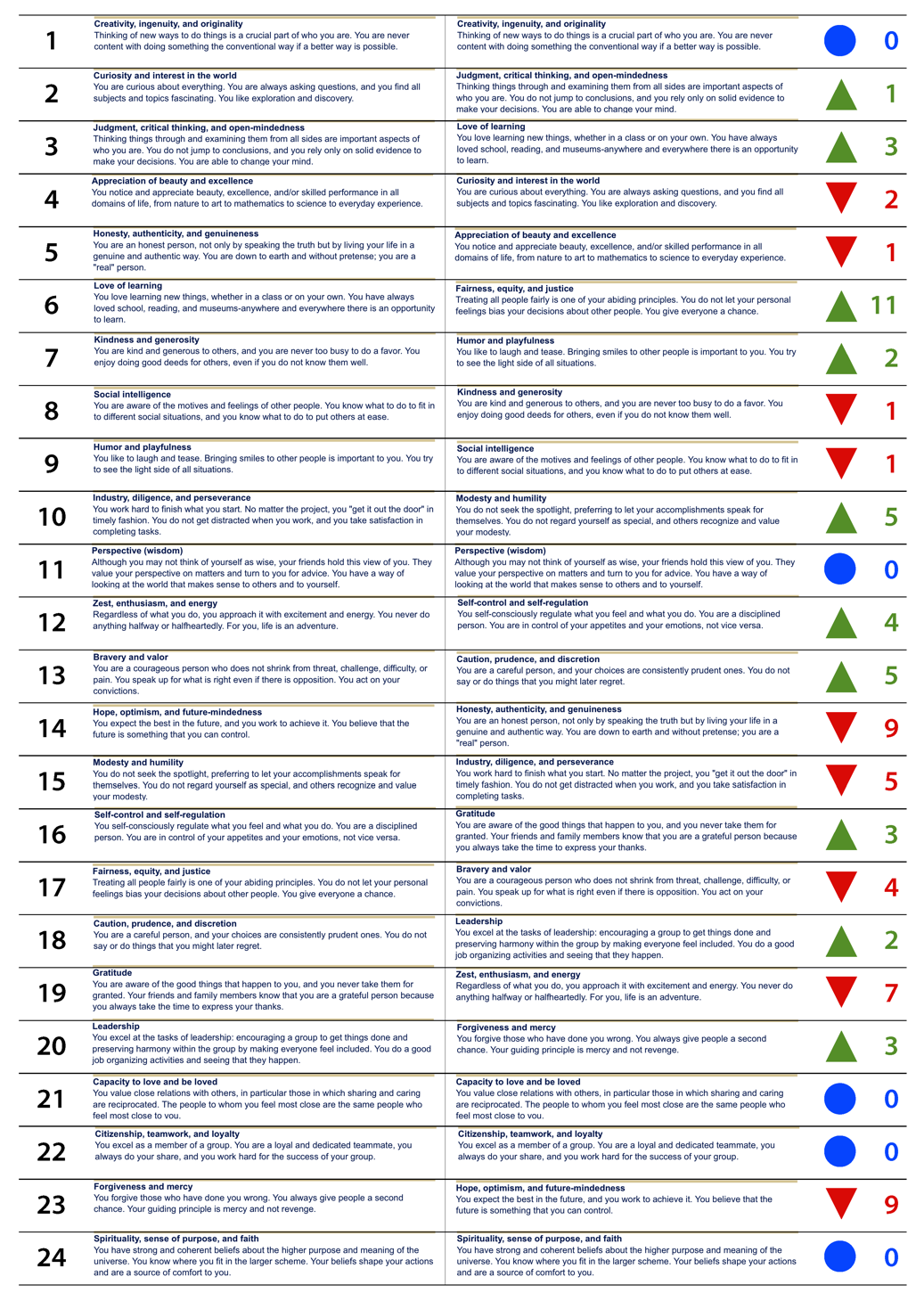“We held a mirror up to the Doctor, and — apparently — he didn’t like what he saw.”
The Marquis in “Quills”
Psychology, especially clinical psychology, is frequently focused on negative aspects, deviations, problems, disorders. However, there is a whole branch of psychology which focuses on the positive aspects. The main researcher in this area (Martin E.P. Seligman) wrote a couple of books about the topic, among others “Authentic Happiness” and “Flourish”. I took a quick look at “Flourish” and put it on my “need to read” list. Looks very interesting.
One thing I really admire about Seligman is that he uses the internet to gather data and to help others find out things about themselves. Sure, he also uses it to advertise for his books, but I love this practice-oriented approach. Recently, a comment on Twitter with a link to this posting reminded me of his website (“Authentic Happiness“). It offers a couple of questionnaires which provide information about your key strengths, and give you feedback on your overall happiness (divided in emotion, engagement and meaning) and life satisfaction.
I did the tests in 2008 and just did them again. It was a bit sobering looking at the results (a bit like the quote in the beginning of this posting).
Besides happiness and life satisfaction (which I am not going into here), the skills were pretty revealing to me. Given that I created a new profile (I did not want to see the values from before), I manually compared my strengths between 2008 and 2013. The positions and the movements make total sense to me, unfortunately in some cases, but the last 5 years did have an influence. It’s perhaps a bit risky to make them public because the results are easy to misinterpret (see text below), but this is how the skills came out for me:

Of course, the use of any test or statistic depends on what went into it and what you can infer from it. The values are based on self-reports, it’s not a 360° feedback, or some kind of assessment of actual behavior. Also, psychology is not a deterministic science — people are highly complex and all tests can only deliver approximate results and they can be wrong in some cases. Psychology is better, much much better, than common sense — it is right more often — but it cannot be right all the time.
Perhaps the main issue is that the raw scores are not available, you see only the 24 strengths in a rank order. There is no way of knowing whether your highest skills are high compared to the population or on the scale itself, or whether your lowest skills are actually that low — or still comparatively strong skills when compared with the population at large or the scale itself that just came in last, because you have even stronger skills that occupied the first positions. I would assume that each question of the test influences only one skill (although the skills are probably not independent of each other). So it would be possible to max out all skills, or floor each one, and still get a rank order of the 24 skills from best to worst skill — albeit with a completely different implication.
However, I wonder whether it is possible to see these skills as a rank-order of goals in life. I don’t think they are intended for that, but given that skills usually get better with practice, would this mean that I value creativity and critical thinking more than, say, loving others and being loved in return? That would require, probably among others, 1) meaningful differences between the rank positions of the skills (i.e., it’s one thing to order them descriptively, quite another to assert that one skill is really distinctly better developed than another), 2) assume there are no predispositions to skills, which would explain differences independent of practice, and 3) assume that each skill is improved equally given the same amount of practice. Probably highly unlikely, but it provokes some interesting thoughts. For example, what would happen if fairness becomes more important than critical thinking? Would you become one of those blind activists, screaming “justice!” without listening to reason? It would explain a great deal.
But still, I found the results very interesting … a helpful source for reflection. If case you are curious, the website is: http://www.authentichappiness.sas.upenn.edu
As with any self-reflection, remember to take small doses only.
Hoi Daniel,
Thank you for your blog, for everything in it. it’s a real pleasure to read you.
one quick question: would you explain a little bit more your final remark: “As with any self-reflection, remember to take small doses only.” The reason(s) of “small doses only”?
all the best,
Jh
Hoi,
good question, I used the question for a posting. Hope it answers this question 🙂
Best regards
Daniel